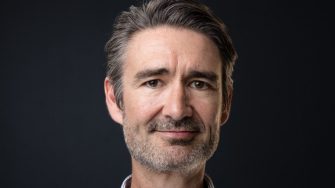Meet our WRC Researcher
Professor Michael Manefield
Professor Michael Manefield

Professor Manefield is a passionate lecturer, research supervisor and science communicator. He’s even launched a series of children’s books and a 500-piece microbiology jigsaw puzzle — all part of his mission to get even the youngest of minds excited about microbiology.
Professor Michael Manefield has a confession to make.
“I’m not an engineer,” he says.
“I’m actually an environmental scientist by training but with a deep love for microbiology.”
That Professor Manefield has found his way to the Water Research Centre, which is located firmly within the UNSW Faculty of Engineering, reflects the shift that his research has taken over the last 10 years.
During an early career spent doing scientific discovery work, he became an expert in the identification of different types of bacteria that could break down contaminants in groundwater, soil and saturated sediments.
Among other things, he discovered the world's first chloroform degrading bacterial culture; a type of bacteria that respires a volatile organic compound called isoprene; and the first bacterial quorum sensing inhibitors (that is, metabolites that can interrupt bacteria’s pheromone communication systems), which could offer new hope in a post-antibiotic world.
But, while the discovery work was fascinating — and rewarding, winning him a 2005 Young Tall Poppy award and a 2006 Eureka Prize — Professor Manefield increasingly found himself drawn to the solutions side of environmental microbiology.
“I was going to industry conferences, especially in the US, and seeing that they had this fantastic bioremediation scene there where people were using science and engineering to clean up contaminated sites. That wasn’t really happening in Australia,” he says.
“So I actually started a company called Micronovo that made this expertise and the bacteria we were discovering available to industry.
“There’s been this general drift way from fundamental discovery-type work towards application, which made the Water Research Centre a great fit.”
Today, Professor Manefield works almost entirely on industry-funded research projects, partnering with companies like Orica and Dow to remediate contaminated sites across Australia.
“It’s all driven by industry partners coming and saying, ‘Mike, we’ve got this problem. Do you have a bacterium that can break down this contaminant? And if you don’t, can you find one?’” he says.
Partners send contaminated groundwater samples to Professor Manefield and his team, who test them to see whether the bacteria needed to treat the contaminants already exist at the site. If they do, “that’s cool – you just need to feed them,” he says.
“We add nutrients, nurture them and create a metabolic trap to capture the organisms that we want and encourage them to grow. If the site doesn’t have the right bacteria, then we can add it to the groundwater.
“So, we grow up hundreds of litres of culture and inject the inoculum into the groundwater to accelerate the contamination degradation.”
It’s vital work — according to the latest figures, the NSW Environmental Protection Authority had received notification of more than 1,805 contaminated sites in NSW.
These include everything from dry cleaners and petrol stations all the way through to historically significant and chemically complex sites like the Rhodes Peninsula, where Agent Orange was produced for use in the Vietnam War.
Despite the scale of the challenge, Professor Manefield remains optimistic — bioremediation offers faster, more effective and less environmentally impactful clean-up outcomes than traditional dig-and-dump or pump-and-treat methods, which means his work is delivering real benefits to the planet.
More broadly, he remains fascinated by environmental microbiology in all its forms, and about mentoring the next generation of leaders in the field.
In 2010, he co-founded the Joint Academic Microbiology Seminars (JAMS), Australia’s first ever-society for environmental microbiologists. With a focus on supporting early career researchers, JAMS now has branches in Sydney, Adelaide, Brisbane, Kuala Lumpur, Singapore and London.
Professor Manefield is also a passionate lecturer, research supervisor and science communicator. He’s even launched a series of children’s books and a 500-piece microbiology jigsaw puzzle — all part of his mission to get even the youngest of minds excited about microbiology.
And there’s a lot to be excited about.
“There are around 1030 — that’s the one with 30 zeros — microorganisms on the planet. It’s a hundred million times the number of stars in the universe,” he says.
“Even though they're tiny, you could start to appreciate with those numbers that they have a massive impact on our biochemical cycles, just by virtue of their extraordinary abundance.
“So environmental microbiology is important — for wastewater treatment, for contaminated site remediation, for plant and animal agriculture. Without it, society would collapse.”